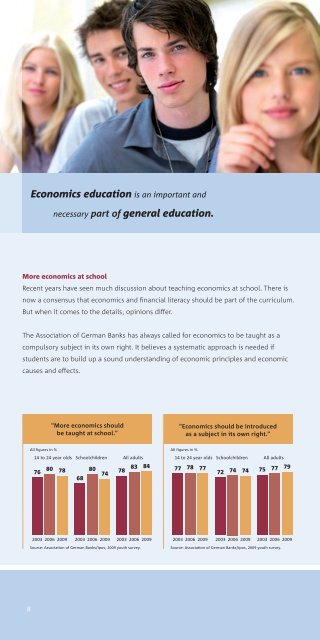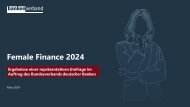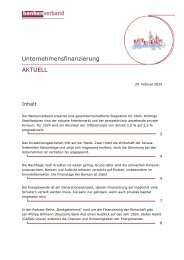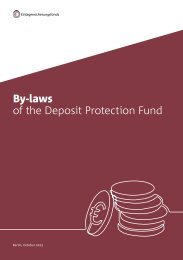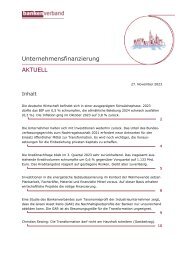Economics for the classroom
Getting young people interested in economics and making the subject more accessible to them - that is the target the Association of German Banks has set itself.
Getting young people interested in economics and making the subject more accessible to them - that is the target the Association of German Banks has set itself.
You also want an ePaper? Increase the reach of your titles
YUMPU automatically turns print PDFs into web optimized ePapers that Google loves.
<strong>Economics</strong> syllabus<br />
<strong>Economics</strong> education is an important and<br />
More economics at school<br />
Recent years have seen much discussion about teaching economics at school. There is<br />
now a consensus that economics and financial literacy should be part of <strong>the</strong> curriculum.<br />
But when it comes to <strong>the</strong> details, opinions differ.<br />
The Association of German Banks has always called <strong>for</strong> economics to be taught as a<br />
compulsory subject in its own right. It believes a systematic approach is needed if<br />
students are to build up a sound understanding of economic principles and economic<br />
causes and effects.<br />
All figures in %<br />
76 80 78<br />
“More economics should<br />
be taught at school.”<br />
14 to 24 year olds<br />
necessary part of general education.<br />
Schoolchildren<br />
68<br />
80 74<br />
All adults<br />
78 83<br />
84<br />
“<strong>Economics</strong> should be introduced<br />
as a subject in its own right.”<br />
All figures in %<br />
14 to 24 year olds<br />
77 78 77<br />
Schoolchildren<br />
72<br />
74 74<br />
All adults<br />
75 77<br />
79<br />
Blueprint <strong>for</strong> economics education<br />
To highlight <strong>the</strong> importance of putting <strong>the</strong><br />
subject on <strong>the</strong> curriculum, <strong>the</strong> Association<br />
of German Banks and <strong>the</strong> Institute of<br />
<strong>Economics</strong> Education at Oldenburg<br />
University in May 2008 published a blueprint<br />
<strong>for</strong> teaching economics at non-vocational<br />
schools. The publication is <strong>the</strong> first of its<br />
kind to set out an economics syllabus <strong>for</strong> all<br />
levels of education from primary school to<br />
Abitur (university entrance qualification).<br />
In addition, <strong>the</strong> report puts <strong>for</strong>ward a<br />
detailed proposal <strong>for</strong> training specialist<br />
teachers in a degree course leading to<br />
a Bachelor and Master of <strong>Economics</strong><br />
Education.<br />
The blueprint has been well received and<br />
has given new impetus to <strong>the</strong> debate on<br />
improving <strong>the</strong> teaching of economics. The<br />
conviction that economics should be taught<br />
as a school subject is gaining ground.<br />
What students think<br />
Students would also like to see more<br />
emphasis on economics at school. They<br />
want to learn more about economic<br />
principles in <strong>the</strong> <strong>classroom</strong> and a large<br />
majority are in favour of introducing<br />
economics as a subject in its own right.<br />
Their wish should not be ignored. Young<br />
people evidently take <strong>the</strong> view that<br />
economics is an essential part of general<br />
education. And adults agree with <strong>the</strong>m.<br />
2003 2006 2009 2003 2006 2009 2003 2006 2009<br />
Source: Association of German Banks/ipos, 2009 youth survey.<br />
2003 2006 2009 2003 2006 2009 2003 2006 2009<br />
Source: Association of German Banks/ipos, 2009 youth survey.<br />
8<br />
9


